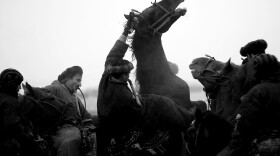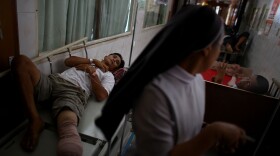
David Gilkey
David Gilkey and NPR's Afghan interpreter and fellow journalist Zabihullah Tamanna were killed June 5, 2016, near Marjah, in southern Afghanistan.
They were traveling with an Afghan army unit when the convoy came under fire. Their vehicle was struck by shell fire. David and Zabihullah did not survive.
You can find tributes to David and Zabihullah on NPR.org.
David Gilkey was a staff photographer and video editor for NPR, covering both national and international news. He produced award-winning photo essays, videos, and multimedia presentations for NPR.org, as well as radio reports for NPR.
As one of the first unilateral journalists to move into Afghanistan and the first to cross the border into Iraq while embedded with the U.S. Army, Gilkey covered the war on terrorism since the September 11, 2001, terrorist attacks. In that time, he made numerous trips back to both countries, most recently covering U.S. operations in southern Afghanistan.
In 2009, Gilkey covered the conflict between Israel and Hamas in Gaza. The next year he made numerous trips to Haiti to cover the devastating earthquake that hit the island nation in January. Gilkey documented the fall of apartheid in South Africa, famine and conflict in Somalia, tribal warfare in Rwanda, and the war in the Balkans.
Throughout his career, Gilkey received numerous awards from both national and international photo competitions. In 2011, Gilkey was named Still Photographer of the Year by the White House Photographers Association (WHPA). In addition, he earned 36 distinctions from the WHPA since 2009, including nine first place awards.
Gilkey's contribution to the NPR Investigation "Brain Wars: How the Military is Failing the Wounded" was recognized by a 2010 George Polk Award. That series was also honored with Society for News Design's 2011 Award of Excellence and a 2011 Dart Award for Excellence in Coverage.
He received a 2007 national Emmy award for a video series, "Band of Brothers," about Michigan Marines in Iraq. In 2004, he was named Michigan "Photographer of the Year" by the Michigan Press Photographers Association.
Gilkey studied journalism at Oregon State University. His first job was at the Boulder (CO) Daily Camera, where he handled local assignments for the paper and overseas assignments for Knight Ridder. He later joined the Detroit Free Press where he worked until 2007. He joined NPR in 2007.
-
The photo showed a little boy. He was found naked on a beach in Liberia and was very sick, most likely with Ebola. The world was deeply touched. And hoped for a miracle. But his story has a sad end.
-
NPR photographer David Gilkey went to Cuba and made images of the one thing his editor told him to avoid: cars.
-
A snapshot of goat-grabbing, a popular sport in Afghanistan.
-
A pet reindeer in a pickup truck. The reindeer's name: Velvet Eyes.
-
NPR photographer David Gilkey has photographed in extreme situations — from the surge in Afghanistan, to bombings in Gaza, to the tsunami in Japan, but nothing could have prepared him for what he saw in the village of Barangay 68 in Tacloban City, Philippines.
-
In the typhoon-ravaged heart of the Philippines, many hospitals were badly damaged or destroyed by the storm. NPR photojournalist David Gilkey takes a look at one hospital that continues to operate despite a lack of food, water or medical supplies.
-
Saying goodbye to something you've known for a decade can be a landmine of emotion — even if that thing is a war.






